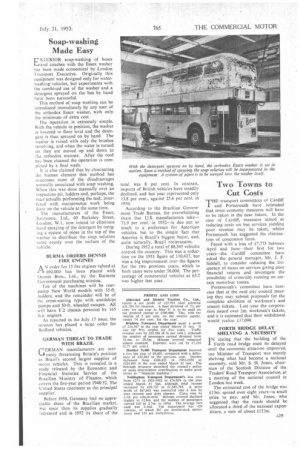Soap-washing Made Easy
Page 31

If you've noticed an error in this article please click here to report it so we can fix it.
EXTERIOR soap-washing of buses 1--dand coaches with the Essex washer has been made economical by London Transport Executive. Originally this equipment was designed only for waterwashing, vehicles, but experiments with the combined use of the washer and a detergent sprayed on the bus by hand have been successful.
This method of soap washing can be introduced immediately by any user of the orthodox Essex washer, with only the minimum of extra cost.
The operation is extremely simple. With the vehicle in position, the washer is lowered to floor level and the detergent is then sprayed on by hand. The washer is raised with only the brushes revolving, and when the water is turned on they are moved up and down in the orthodox manner. After the roof ha, been cleaned the operation is completed by a final wash.
Ft is also claimed that by eliminating the human element this method has overcome most of the disadvantages normally associated with soap washing. When this was done manually over an inspection pit, ladders and, perhaps, the manactually performing the task, interfered with maintenance work being done on the vehicle at the same time.
The manufacturers of the Essex,• Stratstone, Ltd., 40 Berkeley Street, I ondon, W.1, now intend to eliminate hand spraying of the detergent by merging a system of pipes in the top of the washer to distribute the soap solution more evenly over the surface of the chicle.
BURMA ORDERS DENNIS FIRE ENGINES
AN order for 15 fire engines valued at t:60,000 has been placed with Dennis Bros., Ltd., by the Burmese Government purchasing mission.
Ten of the machines will be rearpump New World models with 35-ft. ladders, and the remainder will be of the cross-seating type with amidships pumps and 50-ft. wheeled escapes. All will have F.2 chassis powered by 165 h.p. engines.
As reported in the July 17 issue, the mission has placed a large order for Bedford vehicles.
GERMAN THREAT TO TRADE WITH BRAZIL
("ERMAN manufacturers are seriously threatening Britain's position as Brazil's second largest supplier of motor vehicles. This is revealed in a study released by the Economic and Financial Statistics Service of the Brazilian Ministry of Finance, which covers the five-year period 1948-52. The United States continues as the principal supplier.
Before 1950, Germany had no appreciable share of the Brazilian market, hut since then its supplies gradually increased and in 1952 its share of the total was 8 per cent. In contrast. imports of British vehicles have steadily declined, and last year represented only 13.8 per cent., against 25.6 per cent, in 1950.
According to the Brazilian Government Trade Bureau, the overwhelming share that U.S. manufacturers take71.9 per cent. in 1952—is due riot so much to a preference for American vehicles, but to the simple fact that America is, Brazil's biggest buyer, and, quite naturally, Brazil reciprocates.
During 1952 a total of 88,345 vehicles entered the country. This was a reduction on the 1951 figure of 110,437, but was a big improvemerft over the figures for the two previous years, which in both cases were under 50,000. The percentage of commercial vehicles at 63.2 was higher last year.
Two Towns to Cut Costs
THE'transport committees of Cardiff and Portsmouth have intimated that strict economy measures will have to be taken in the near future. In the case of Cardiff, measures aimed at reducing costs on bus services yielding poor revenue may be taken, whilst Portsmouth has suggested the elimination of concession fares.
Faced with a loss of £7,773 between April and June—their first for two years—the Cardiff committee have asked the general manager, Mr. J. F. Siddall, to consider reducing the frequency of buses on services giving poor financial returns and investigate the possibility of cross-city running on certain motorbus routes.
Portsmouth's committee have forecast that at the next city council meeting they may submit proposals for the complete abolition of workmen's and season tickets. Last year the corporation issued over 2m. workmen's tickets, and it is estimated that their withdrawal would realize £17,000.
FORTH BRIDGE DELAY SHELVING A NECESSITY TN stating that the building of the Forth road bridge must be delayed until the economic situation improved, tile Minister of Transport was merely shelving what had become a national necessity, said Mr. S. H. Jones, chairman of the Scottish Division of the Traders' Road Transport Association, at a meeting of the national council in London last week.
The estimated cost of the bridge was £.13m. spread over eight years—a small price to pay, said Mr. Jones, who suggested that the roads should be allocated a third of the national expenditure, a sum of about' Ll 23m.




















































































